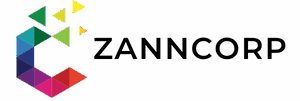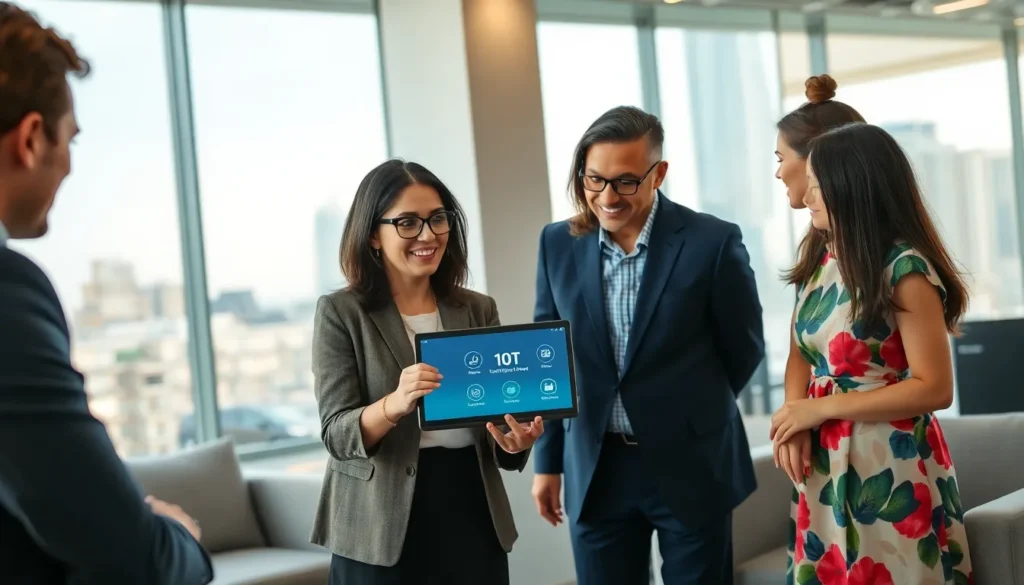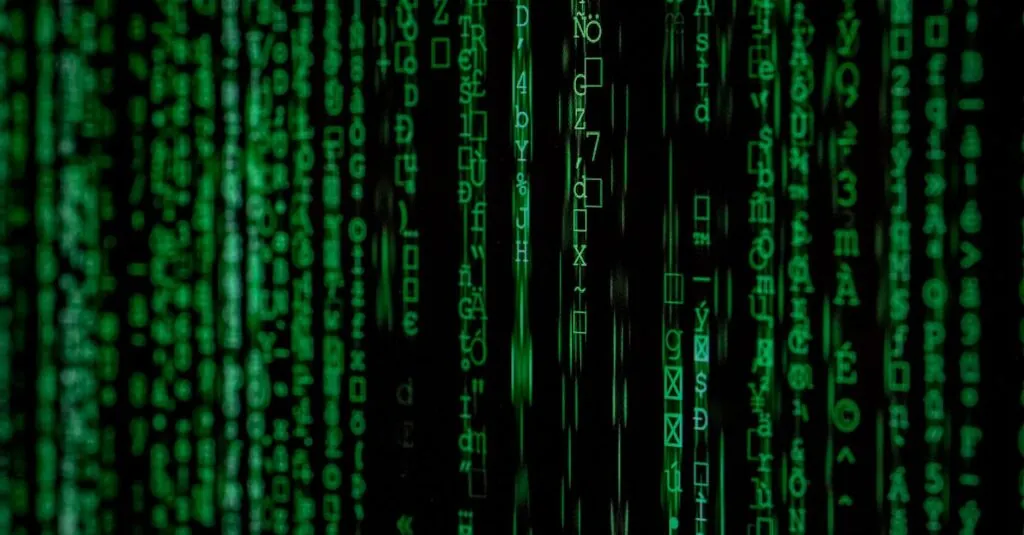Table of Contents
ToggleThe Internet of Things (IoT) is no longer just a buzzword thrown around at tech conferences; it’s a reality that’s transforming everyday life. From smart fridges that remind you when to restock your snacks to wearables that track your every move (yes, even that extra slice of pizza), IoT is everywhere. But wait, there’s more! The industry is evolving faster than a toddler on a sugar rush, and keeping up can feel like trying to catch a greased pig at a county fair.
Overview of IoT Industry News
The IoT industry showcases significant advancements, particularly in smart home devices and healthcare applications. Recent news illustrates the increasing integration of AI within IoT frameworks, enhancing device efficiency and user experience. Companies like Amazon and Google lead the market with innovations in smart speakers and home security systems. New partnerships emerge frequently, fueling collaborations aimed at creating seamless interconnected ecosystems.
Innovative IoT solutions appear in agriculture, where precision farming technologies optimize resource management and boost crop yields. Additionally, energy management systems offer substantial savings, allowing businesses to monitor and reduce consumption in real time. Reports indicate that global investments in IoT technologies are anticipated to reach $1 trillion by 2030, signifying immense market potential.
Regulatory developments also impact the industry. Organizations advocate for standardized security protocols to protect data privacy as IoT devices proliferate. Efforts to establish these frameworks aim to mitigate potential vulnerabilities associated with connected devices. Meanwhile, sustainability concerns drive the development of IoT products designed to reduce waste and promote energy efficiency.
Market research highlights the growing demand for wearables in healthcare. These devices enable remote monitoring of patients and provide real-time health data to medical professionals. Surveys reveal that nearly 40% of consumers are interested in using smart health devices, indicating a shift towards proactive health management.
Investors are increasingly focused on companies that prioritize innovation and sustainability within the IoT sector. Many startups are emerging, offering unique solutions tailored to specific market needs. Anticipation builds around how these developments will reshape industries and everyday life in the coming years.
Recent Developments in IoT Technology
Recent advancements in the IoT industry demonstrate remarkable progress in various sectors, particularly smart homes and healthcare solutions.
Breakthrough Innovations
Smart home devices are experiencing significant breakthroughs, with companies like Amazon and Google leading the charge. Innovations in AI are driving efficiency in smart speakers and security systems, allowing for better user experiences. New devices often integrate seamlessly into existing ecosystems, enhancing functionality without overwhelming users. Notably, agricultural IoT applications utilize precision farming to optimize resources, making farming more sustainable. Energy management systems are empowering businesses to monitor consumption and reduce costs in real time. These transformative technologies are redefining daily operations across different sectors.
Emerging Trends
Current trends in IoT reflect a growing focus on sustainability and data privacy. Organizations advocate for standardized security protocols to protect consumer data as IoT adoption rises. Moreover, there’s increasing interest in wearables for healthcare, with nearly 40% of consumers expressing enthusiasm for smart health devices. Remote patient monitoring is becoming commonplace, offering medical professionals real-time health data. Startups are also emerging, providing innovative solutions tailored to specific market demands. Anticipated investment in IoT technologies suggests a shift towards prioritizing innovation while addressing environmental concerns.
Key Players in the IoT Market
The IoT market features a mix of established giants and innovative startups shaping its future. Major companies lead with groundbreaking technologies that drive market growth.
Major Companies
Amazon, Google, and Microsoft dominate the IoT landscape. Each company invests heavily in research and development to enhance device capabilities. Amazon’s Alexa and Google Assistant excel in smart home integration, while Microsoft focuses on cloud services for IoT applications. Significant investments in AI integration improve user experiences and efficiency across various devices. These companies also engage in strategic partnerships, fostering interoperability among products. According to market research, nearly 40% of consumers are interested in smart devices, reflecting heightened engagement with major brands.
Startups and Disruptors
Numerous startups disrupt the IoT market by introducing innovative solutions. Companies like Augmenta and Samsara leverage advanced technologies in agriculture and transportation, respectively. Each startup addresses specific pain points through tailored applications. Collaborations often emerge between new players and established firms to expand market reach. Investors prioritize startups emphasizing sustainability and data privacy, aligning with consumer preferences. Startups rapidly adapt to changing trends, contributing to the dynamic nature of the IoT industry. Their agility allows them to capture unique market opportunities and promote technological advancements.
Impacts of IoT on Various Sectors
The Internet of Things (IoT) plays a pivotal role in transforming various sectors, enhancing efficiency and connectivity. Its presence is felt significantly in healthcare, agriculture, and smart cities.
Healthcare
Healthcare systems benefit from IoT through remote patient monitoring and real-time health data collection. Wearable devices enable medical professionals to track patients’ vital signs continuously, improving response times. Nearly 40% of consumers express interest in using smart health devices, indicating a shift toward proactive management. Innovations in telehealth applications allow for virtual doctor consultations, increasing accessibility. Patients experience better outcomes as data from these devices assists in timely decision-making. The integration of IoT in healthcare solutions fosters personalized treatments and enhances overall wellness.
Agriculture
IoT’s impact on agriculture centers around precision farming, optimizing resource management through data-driven insights. Sensors in fields monitor soil moisture levels and crop health, enabling farmers to make informed irrigation decisions. With these advancements, farmers can increase yield while reducing waste and water consumption. Drones equipped with IoT technology scout agricultural areas, providing real-time data for pest and disease control. Consequently, farmers adopt environmentally sustainable practices. The growing demand for such technologies reflects a shift towards smarter, more efficient farming methods.
Smart Cities
Smart cities leverage IoT to enhance urban living and improve public services. Connected infrastructure solutions enable efficient traffic management, reducing congestion and pollution. Sensors monitor air quality, providing data to inform policies aimed at enhancing public health. Additionally, IoT applications facilitate smart energy management, optimizing power consumption in homes and businesses. Increased collaboration among city officials and technology providers accelerates the development of these initiatives. Citizens experience improved services through enhanced connectivity and data-driven insights, supporting community growth.
Challenges Facing the IoT Industry
The IoT industry faces several significant challenges that impact its growth and adoption. Security and regulatory hurdles pose formidable obstacles for companies operating in this space.
Security Concerns
Security stands as a foremost challenge within the IoT landscape. The increasing number of connected devices creates numerous vulnerabilities that cybercriminals exploit. Inadequate security measures can lead to data breaches, compromising sensitive information. A study found that over 70% of consumer IoT devices lack adequate security protections. Organizations must prioritize the implementation of robust encryption and authentication protocols to safeguard user data. Moreover, fostering consumer trust becomes critical for widespread acceptance of IoT technology.
Regulatory Issues
Regulatory issues significantly influence the IoT industry’s trajectory. Shifting policies and standards can create uncertainties for companies developing IoT solutions. Governments are advocating for standardized security protocols to address privacy concerns, yet uniform regulations are still under discussion. An inconsistent regulatory landscape may impede innovation and slow down market growth. Organizations must navigate these evolving regulations while ensuring compliance to avoid potential penalties. Striking a balance between innovation and adherence to regulations is essential for success in the evolving IoT ecosystem.
Conclusion
The IoT industry continues to evolve at a breakneck pace, shaping the way people interact with technology in their daily lives. As major players invest heavily in innovation and sustainability, the market is poised for tremendous growth. Emerging startups are addressing specific needs, enhancing competition and driving advancements across various sectors.
With a projected investment of $1 trillion by 2030, the potential for IoT technologies is immense. However, challenges such as security and regulatory compliance remain critical. As the landscape shifts, the focus on user privacy and data protection will be paramount. The future of IoT promises increased efficiency and connectivity, making it an exciting space to watch in the coming years.





